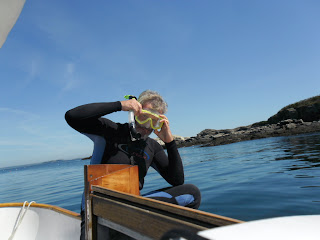
We are back on the Maine Coast for a few weeks break. Sailing was at the top of the list of things to do.
When we were growing up, my father built a Friendship Sloop.
26 feet long, a classic Maine design, the Ellie T's presence in Christmas Cove, Maine spoke heritage and history.
My parents sold the Ellie T when I was out of high school and Dad began plans for building a Cape Cod catboat in his retirement.
Again based on classic New England lines, this boat was 10 feet smaller than the Friendship but he took 11 more years than the Friendship to build it.

My mother, who was into painting in the style of Norwegian rosemaeling in those days, graced the cabin with her artwork.
So when we came home, getting the catboat- the Eleanore- into the water and out to sea, was a Maine priority.
I've just come from two great days of sailing:
My brother, who is captaining a 100 passenger cruise ship suggested that we meet for dinner in Boothbay one evening. As the day approached and it was clear that the weather was going to be great, so I opted to sail over to Boothbay from Christmas Cove with the plan to spend the night and then sail back the next day.
I headed out of the harbor under moderate winds, which meant it would be a several hours journey.
As I was getting out past Heron Island, the 'Independence' which my brother, Henry was skippering, rounded the end of Thrumcap Island.

I stopped for lunch at Ram Island and ...
did a little snorkeling afterwards.
I got to Boothbay and found a mooring near the behemoth.
Jan arrived by car and after we shopped a bit in Boothbay Harbor - a must for every tourist- Henry took us out for a great lobster dinner and for catching up on each other's lives.

The next day, my good friend and doctor Mike joined me for the return trip to Christmas Cove.
If I don't manage another sail before returning to the Ganges, these two days filled my cup.





















































